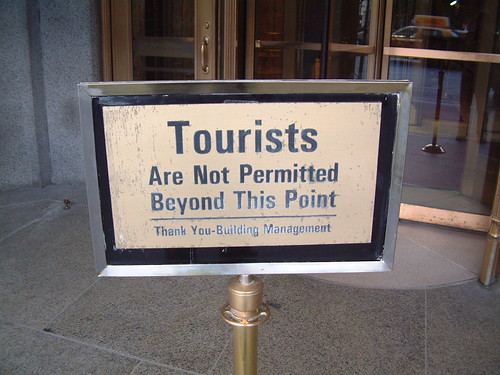sticks and stones

This is the scene:
Waiting for the light to change at Yonge and Bloor, Michael (tall, skinny, Polish-Canadian,) and I (less tall, skinny, Japanese-Canadian) encounter what can only be described as a “moment”. Michael is to the left of me glancing through a book, I have my camera over my shoulder and I’m holding a couple books too. To the right of us, a shortish Caucasian woman approaches us with a concerned, slightly confused look on her face. Although she’s actually looking at Michael. “Are you lost?” she asks. Michael and I look at each other as if to say “whoa, switcheroo. I thought she was going to ask us for directions.” Michael and I utter a confused “no?” There’s a slight pause and she continues, “he looks like a tourist.” Pointing at me. And then she walks away.
Right, so what happened? Starting with the woman’s first question, it’s possible we did look lost. Michael’s bpNichol poetry collection have been a tour guide book, my Coach House Books catalogue could have been a map, and the Guy Maddin compilation could have been another guide book. Michael, being well over six feet, is easy to single out in a crowd and maybe his interest in concrete poetry was so engrossing that it appeared to the woman that he was struggling to isolate the nearest point of Toronto interest. My camera out in the open is certainly shorthand for “tourist” too. Combined with being Japanese-Canadian, or, to the general public, “Chinese,” and with Michael arguably looking “European,” how could the woman not think we weren’t from these parts? Her sheer look of concern and her determination to help us as a friendly Torontonian; all good intentions, no doubt.
But the second part of our encounter is more interesting. I’ll call it her defense. Since we didn’t give her the answer she was expecting, she had any number of possible responses to back up why she might have asked the first question. Off the top of my head, these are the types of responses I can think of, ranked from least problematic to most:
• Sorry, I thought you might be lost.
• You looked like you were lost.
• I thought you might be tourists.
• You looked like tourists.
• You look like a tourist. (addressing just Michael)
• You look like a tourist. (addressing just me)
• He looks like a tourist. (addressing just Michael)
• That oriental guy you’re with who I’m assuming doesn’t speak English looks like a tourist so I won’t even bother, but I’m talking to you because I’m assuming you do speak English since you’re white.
Something tells me, however, that the last point informed her first question no matter what her defense was going to be. I may be exaggerating to make some things more obvious, but remember that she had to talk around or through me to reach Michael. I didn’t even have time to really react because it was such a brief exchange. Michael then suggested that we find a location in eyeshot of the CN Tower and then ask someone where the CN Tower is.
Seeing how actions and assumptions based on race play out in public is always an “uh oh” moment for me. Sometimes it isn’t always so subtle, but this particular time it was veiled under a well-meaning question. So why is there such violence laced in these kinds of questions? I think it has something to do with the assertion of the questioner that they have a certain type of power over their subject and that they have a right to know. For example: “Do you speak English?” “What are you?” “How long have you been here?” and “Are you a boy or a girl?” (for androgynous or trans men and women), “When’s the baby due?” (to women who may or may not be pregnant), “Is that your child?” (to parents of adopted or mixed race children), “Do you have a girlfriend/boyfriend / wife/husband?” (to people assumed heterosexual who may or may not be).
Considering this downtown interaction as a reinforcement of power dynamics makes it easier to understand why it was so uncomfortable. It doesn’t matter that I wasn’t a tourist because the point is that I looked like one. It’s important that she used this word. It’s also important that she didn’t address me directly. You'd think I'd be ready for this type of thing after 23 years, but it's still always unexpected and maybe next time I'll be ready with an "I'm looking for the magic."